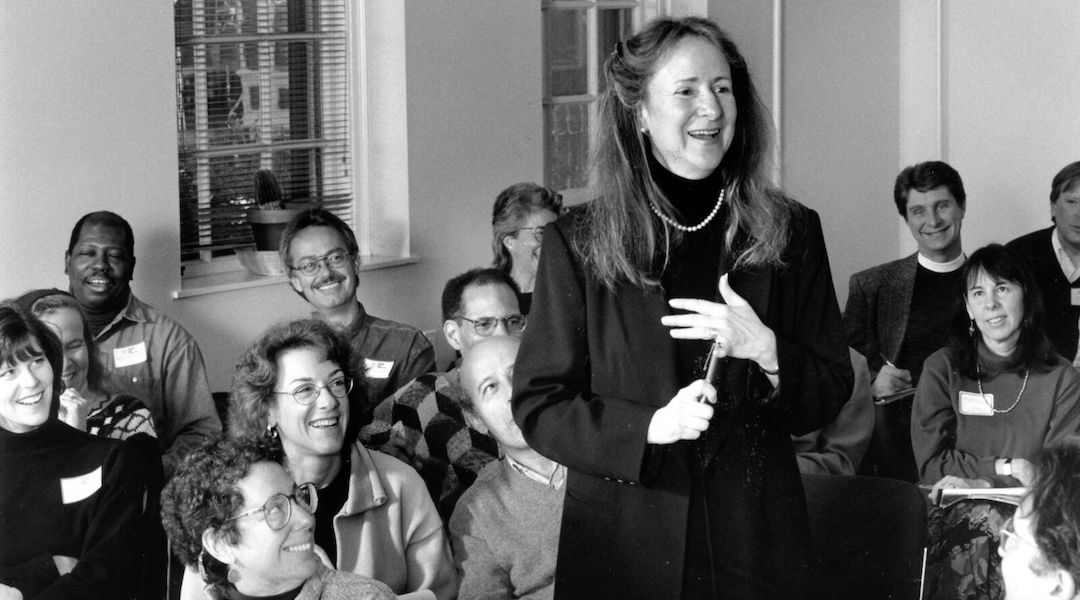Margot Stern Strom, who founded pioneering Holocaust education program Facing History, dies at 81
A curriculum launched in 1976 broke a ‘powerful silence’ about racism and antisemitism in American schools.

Margot Stern Strom, the founder of Facing History & Ourselves, speaks to educators in 1990. (Courtesy Facing History & Ourselves)
(JTA) — Margot Stern Strom, who drew on the pain of her Jewish childhood in the Jim Crow South to create one of the most widely used Holocaust education programs in American schools, died March 28 at her home in Brookline, Massachusetts. She was 81.
The Boston Globe reported the cause as pancreatic cancer.
Strom was a schoolteacher in 1976 when she co-founded Facing History & Ourselves, which drew on draft lessons piloted in her classroom. For three years in the mid-1980s, the U.S. Education Department denied funding for the Holocaust curriculum, in part because of consultants opposed to the curricula and because of right-wing groups, such as Phyllis Schlafly’s Eagle Forum, that objected to the program.
However, due to persistent congressional support for the grants, the program finally broke through in 1989 and began to receive federal funds. During the nearly 40 years Strom spent as head of the nonprofit until her retirement in 2014, its curriculum expanded into classrooms in all 50 states and more than 100 countries.
In recent years, in addition to training thousands of teachers, Facing History brought aging survivors of the Holocaust and other important historic events into hundreds of classrooms to share their stories.
“Margot Strom is a visionary,” former Harvard Law School Dean Martha Minow said when Strom received the 2015 Massachusetts Governor’s Award in the Humanities. “She had a unique idea and she has translated that idea into an organization that has an impact around the world.”
Margot Stern was born Nov. 10, 1941 in Chicago, Illinois to Fan and Lloyd Stern. After the family moved to Memphis, Tennessee, she was exposed to the racism facing Black people and the intolerance that extended to her small Jewish community. “One Jewish cheerleader at a time was the custom on our high school squad,” she recalled, according to a reminiscence by Facing History. “We had Jewish high school sororities and one Jew a year was chosen as an honorary member of a Christian sorority. We all lived by these rules.”
In 1964, Strom earned a bachelor’s degree in history at the University of Illinois Urbana-Champaign. After graduating she became a teacher, starting out in Skokie, Illinois and eventually moving with her husband Terry Strom and their young family to the Boston suburbs, where she taught eighth grade language arts and social studies.
In the spring of 1975, according to Facing History, she and fellow teacher Bill Parsons attended a workshop on the Holocaust and realized how little they taught and how little their students knew about the genocide of Jews during World War II. (Parsons, who would later serve as chief of staff at the U.S. Holocaust Memorial Museum, died in 2016.)
They went on to secure interest and funding from local philanthropists and educators to expand her lesson plans into a curriculum used in classrooms around the country.
“As an educator, Margot believed in her students — whether they were in middle school, high school, or if they were teachers themselves — and their capacity to think deeply about history, about the world we live in, and about how our choices shape society,” Facing History said in a statement. “She imbued in them the ability to act as moral philosophers, and apply the lessons they learned in class to the world around them.”
Roger Brooks succeeded Strom as Facing History’s president and CEO on Dec. 1, 2014. “She deeply understood the need for upstander education and used her charismatic leadership skills to impart this import to teachers and students around the world,” he said in a statement, using a word popularized by Facing History to refer to the opposite of “bystander.”
In comments that presaged the current debate over teaching about racism and gender in public schools around the country, Strom once commented on the schoolroom atmosphere she faced when first promoting the Holocaust studies curriculum.
“There was a powerful silence about race and racism and no mention of antisemitism or the Holocaust,” she wrote in a personal history of the organization. “‘Bad history’ was best forgotten. The Civil War was the War Between the States and we were taught how the South won the major battles. In my Tennessee history class I did not learn who lost the Civil War.”
Strom is survived by her son, Adam, the executive director and cofounder of the Boston nonprofit Re-Imagining Migration; daughter, Rachel Fan Stern Strom of Brooklyn; and four grandchildren. Her survivors also include her brother Gerald Stern, who was an attorney with the civil rights division of the U.S. Justice Department under then-Attorney General Robert F. Kennedy, and her sister, Paula Stern of Washington, D.C., who formerly chaired the U.S. International Trade Commission.
Her husband, Terry Strom, a renowned researcher in organ transplant immunology, died in 2018.
This article originally appeared on JTA.org.















